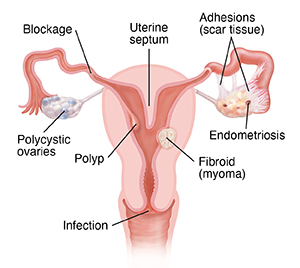Fertility and Reproductive Medicine
Everyone deserves to achieve their dream of building a family. We’re here to help you start your unique journey to parenthood. As a pioneer in the region for fertility care, we blend specialized expertise and advanced technology, delivering excellent outcomes and joyful moments.
Why choose us for fertility testing and treatment?
BJC HealthCare works with WashU Medicine physicians and providers across the region to deliver extraordinary care. Choosing the right place for fertility testing and treatment is a crucial first step in your journey to parenthood. You need compassion, support, and a care team you can trust. With BJC HealthCare, you’ll have access to:
- Regional fertility leaders: People from all over the Midwest turn to us for our expertise in fertility care. Our pregnancy and live birth rates from IVF at the Fertility and Reproductive Center at WashU Medicine and Barnes-Jewish Hospital are consistently higher than the national average.
- High-volume fertility center: We evaluate and treat thousands of couples and individuals for infertility each year. These high numbers translate to a higher level of expertise in our physicians and more successful outcomes for our patients.
- Experienced team: We partner with board-certified and fellowship-trained reproductive endocrinology and infertility specialists and genetic counselors and have experienced lab technicians. Their depth of expertise allows us to offer treatment even for the most complex cases of infertility.
- Advanced technologies: In 1985, the first baby in Missouri conceived by in vitro fertilization (IVF) was born. The parents received IVF treatment at the WashU Medicine at Jewish Hospital, now Barnes-Jewish Hospital. Today, we continue to offer pioneering treatments to help you build a family.
- Personalized approach: Our goal is to provide the right fertility plan for your needs and situation. We tailor treatment to meet your individual needs. Treatment ranges from minimally invasive techniques or drug therapies to in vitro fertilization (IVF) or third-party reproduction (using donor sperm, donor eggs, or a gestational carrier).
- Inclusive care: We welcome all individuals, regardless of gender, sexual orientation, or marital status. The Fertility and Reproductive Medicine Center at WashU Medicine and Barnes-Jewish Hospital prides itself on offering comprehensive LGBTQIA+ family-building services. We are consistently recognized as a HealthCare Equality Leader.
What is Fertility and Reproductive Medicine?
Problems that affect a woman's fertility can be treated in several ways. Some treatments help sperm or eggs pass through the reproductive tract. Others help an embryo implant in the uterus. Your healthcare provider will talk with you about your options.
We understand gender is a spectrum. We may use gendered terms to talk about anatomy and health risk. Please use this information in a way that works best for you and your health care provider as you talk about your care.
Treating the cervix
Problems with the cervix may stop sperm from entering the uterus. They include:
- A lack of cervical mucus. This can slow or block the passage of sperm. This can be treated with assisted reproductive techniques.
- An infection. This can be treated with antibiotics.
Treating the fallopian tubes
There may be a problem in the fallopian tubes. This can stop sperm from reaching an egg. The treatment depends on the cause. Causes include:
- A tubal blockage near the uterus. This can be treated by putting a thin tube (catheter) through the blocked tube. Or it can be treated by using assisted reproductive techniques.
- Scar tissue (adhesions). These can be removed with surgery. Or assisted reproductive techniques may be used.
Improving implantation
A fertilized egg may not implant in the uterus for several reasons. The treatment depends on the cause. Causes include:
- Problems with the endometrium. These can be treated with hormone therapy.
- Scar tissue in the uterus. This is treated with surgery.
- Small growths called fibroids. These are removed with surgery.
- A uterine septum. This is tissue that divides the uterus into two parts inside. This is treated with surgery.
Treating endometriosis
The endometrium is the lining of the uterus. In some cases, this tissue can grow in other parts of the reproductive tract. It can lead to fertility problems. Laparoscopic surgery is done to remove the tissue.
Reversing tubal ligation
Tubal ligation is a surgery to prevent pregnancy by blocking the fallopian tubes. In some cases, it can be reversed with surgery to reconnect the tubes. But the chances of success are not certain. Talk with your health care provider to learn more.
Search for a specialist
Our highly trained team of specialists offers advanced treatments as well as compassionate, personalized care.
Fertility testing and treatments
We draw on a broad range of infertility treatments, from medication to IVF, to optimize your chances of a successful pregnancy. Our surgeons can address some fertility problems, such as uterine fibroids or blocked sperm ducts, with minimally invasive surgical procedures. But your journey to parenthood will be unique, and there’s no one-size-fits-all care plan.
Recent News
Article
What is Secondary Infertility?
News
BJC Hospitals Caring for Newborns Earn Safe Sleep Designation
Patient Story
